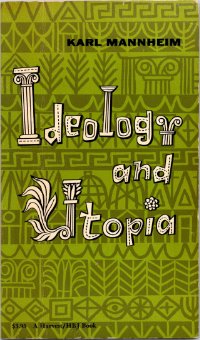By Karl Mannheim
Translated from the German by Louis Wirth and Edward Shils. From the Preface: The original German edition of Ideology and Utopia ap. peared in an atmosphereof acute intellectual tension marked by widespread discussion which subsided only with the exile or enforced silence of those thinkers who sought an honest and tenable solution to the problems raised. Since then the conflicts which in Germany led to the destruction of the liberal Weimar Republic have been felt in various countries all over the world, especially in Western Europe and the United States. The intellectual problems which at one time were considered the peculiar preoccupation of German writers have enveloped virtually the whole world. What was once regarded as the esoteric concern of a few intellectuals in a single country has become t h ecommon plight of the modern man.In response to this situation there has arisen an extensive literature which speaks of the "end," the "decline," the " crisis," the " decay," or the " death " of Western civilization. But despite the alarm….
NY. Harcourt Brace Jovanovich. 1936. 381p. CONTAINS MARK-UP



